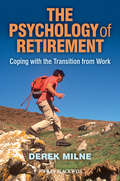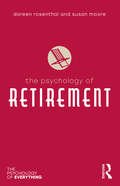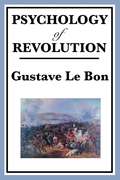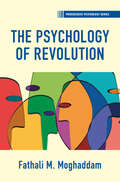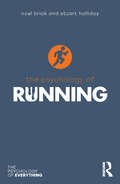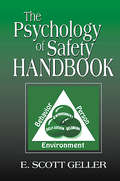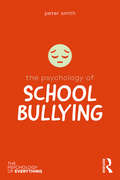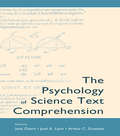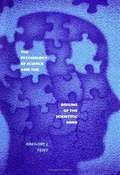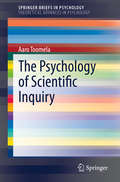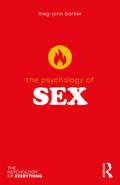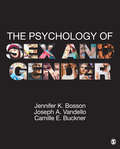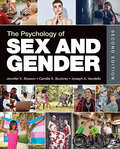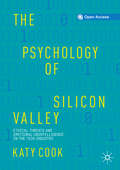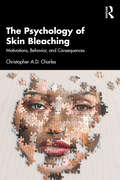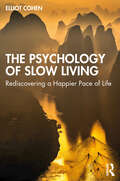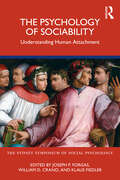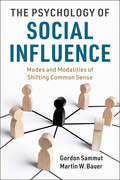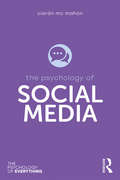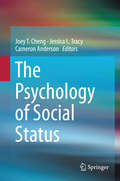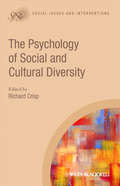- Table View
- List View
The Psychology of Retirement
by Derek MilneThe Psychology of Retirement is the first self-help guide to retirement based on highly proven psychological coping strategies. Provides the most comprehensive and coherent account of the challenges of retirement and the associated aging processRepresents the culmination of over 30 years of clinical, teaching and research involvement in the main issues discussed within this bookDraws systematically on applied scientific theories, accepted professional circles, which are interpreted and communicated by an applied scientist A constructive emphasis establishes the best possible coping strategies and perspectives
The Psychology of Retirement (The Psychology of Everything)
by Doreen Rosenthal Susan MooreHow can you make the most of retirement? How should you plan for retirement? What are the challenges of retirement and how can they be dealt with? The Psychology of Retirement looks at this life stage as a journey that involves challenges, opportunities, setbacks, periods of disenchantment and, often, exciting new beginnings. Taking a positive approach, the book explores how retirement provides opportunities to cultivate new friendships, interests and hobbies, consolidate and renegotiate long-held ones, and even re-invent oneself in a post-work environment. It also emphasizes the value of pre-retirement planning, and the importance of establishing new goals and purposes. Retirement can be a period of significant psychological growth and development and The Psychology of Retirement shows how it can herald the beginning of a vibrant and active stage of life.
The Psychology of Revolution
by Gustave Le BonThe present age is not merely an epoch of discovery; it is also a period of revision of the various elements of knowledge. Having recognised that there are no phenomena of which the first cause is still accessible, science has resumed the examination of her ancient certitudes, and has proved their fragility. To-day she sees her ancient principles vanishing one by one. Mechanics is losing its axioms, and matter, formerly the eternal substratum of the worlds, becomes a simple aggregate of ephemeral forces in transitory condensation.
The Psychology of Revolution (Progressive Psychology)
by Fathali M. MoghaddamBased on decades of psychological research and personal experience, Fathali M. Moghaddam presents a new and dynamic introduction to the psychology of revolution. He sets out to explain what does and does not change with revolution, using the concept of political plasticity or the malleability of political behavior. In turn, psychological theories of collective mobilization, the process of regime change, and explanations of what happens after regime change are discussed. This psychological analysis of the post-revolution period is pertinent because it explains why revolutions so often fail. General readers interested in learning more about the psychology of revolution, as well as students, researchers, and teachers in political psychology, political science, and collective action, will find this book accessible and beneficial.
The Psychology of Running (The Psychology of Everything)
by Noel Brick Stuart HollidayWhy do people run? How can I improve my running performance? Will running help me feel better? The Psychology of Running provides a unique insight into why running is such a popular form of exercise and competition. From evolutionary perspectives on why humans have needed to run and how our bodies have adapted for this function, to discussing evidence-based interventions that can improve running performance, the book delves into the psychological motivations and benefits of running. The book also considers ways in which running can be used for social change and life skill development, highlighting how such a simple activity can have benefits for our physical and mental health. Providing proven psychological strategies and techniques to help improve running performance and boost our individual self-belief, The Psychology of Running shows us how we can enjoy running, no matter our age or ability.
The Psychology of Safety Handbook
by E. Scott GellerYou cannot improve your organization's safety performance to enviable levels without addressing human behavior and attitude effectively. The only comprehensive reference on the psychology of the human dynamics of safety, The Psychology of Safety Handbook shows you how to apply psychology to improve safety and health in your organization. Dr. Geller
The Psychology of School Bullying (The Psychology of Everything)
by Peter K. SmithWhy do children get involved with bullying? Does cyberbullying differ from traditional bullying? How can bullying at school be prevented? The Psychology of School Bullying explores what bullying is and what factors lead to children playing roles as bullies, victims, defenders, bystanders or even some combination of these The book examines proactive strategies to reduce the likelihood of bullying happening in school, but also looks at what action the school could take if bullying incidents do occur. As bullying can have such far-reaching consequences and sometimes tragic outcomes, it is vital to grasp how and why it happens, and The Psychology of School Bullying shows how improved knowledge and understanding can lead to effective interventions.
The Psychology of Science Text Comprehension
by Arthur C. Graesser José Otero José A. LeónThis volume's goal is to provide readers with up-to-date information on the research and theory of scientific text comprehension. It is widely acknowledged that the comprehension of science and technological artifacts is very difficult for both children and adults. The material is conceptually complex, there is very little background knowledge for most individuals, and the materials are often poorly written. Therefore, it is no surprise that students are turned off from learning science and technology. Given these challenges, it is important to design scientific text in a fashion that fits the cognitive constraints of the learner. The enterprise of textbook design needs to be effectively integrated with research in discourse processing, educational technology, and cognitive science. This book takes a major step in promoting such an integration. This volume: *provides an important integration of research and theory with theoretical, methodological, and educational applications; *includes a number of chapters that cover how science text information affects mental representations and strategies; *introduces important suggestions about how text design and new technologies can be thought of as pedagogical features; and *establishes academic text taxonomies and a consensus of the criteria to organize inferences and other mental mechanisms.
The Psychology of Science and the Origins of the Scientific Mind
by Gregory J. FeistGregory Feist reviews and consolidates the scattered literatures on the psychology of science, then calls for the establishment of the field as a unique discipline. He offers the most comprehensive perspective yet on how science came to be possible in our species and on the important role of psychological forces in an individual's development of scientific interest, talent, and creativity. Without a psychological perspective, Feist argues, we cannot fully understand the development of scientific thinking or scientific genius. The author explores the major subdisciplines within psychology as well as allied areas, including biological neuroscience and developmental, cognitive, personality, and social psychology, to show how each sheds light on how scientific thinking, interest, and talent arise. He assesses which elements of scientific thinking have their origin in evolved mental mechanisms and considers how humans may have developed the highly sophisticated scientific fields we know today. In his fascinating and authoritative book, Feist deals thoughtfully with the mysteries of the human mind and convincingly argues that the creation of the psychology of science as a distinct discipline is essential to deeper understanding of human thought processes.
The Psychology of Scientific Inquiry (SpringerBriefs in Psychology)
by Aaro ToomelaThis brief sets out on a course to distinguish three main kinds of thought that underlie scientific thinking.Current science has not agreed on an understanding of what exactly the aim of science actually is, how to understand scientific knowledge, and how such knowledge can be achieved. Furthermore, no science today also explicitly admits the fact that knowledge can be constructed in different ways and therefore every scientist should be able to recognize the form of thought that under-girds their understanding of scientific theory. In response to this, this texts seeks to answer the questions: What is science? What is (scientific) explanation? What is causality and why it matters? Science is a way to find new knowledge. The way we think about the world constrains the aspects of it we can understand. Scientists, the author suggests, should engage in a metacognitive perspective on scientific theory that reflects not only what exists in the world, but also the way the scientist thinks about the world.
The Psychology of Sex (The Psychology of Everything)
by Meg John BarkerWhat can psychology teach us about sex? How do different bodies and brains respond sexually? How can we prevent people being stigmatised for their sexuality? The Psychology of Sex takes you on a tour through the different ways that psychologists have created and sustained certain understandings of sex and sexuality. Bearing in mind the subjective nature of sex, the book explores cultural concerns around sexualisation, pornography, and sex addiction, as well as drawing on research from sexual communities and the applied area of sex therapy. When so much of our relationship to sex happens in the mind, The Psychology of Sex shows us how important it is to understand where our ideas about sex come from.
The Psychology of Sex and Gender
by Jennifer Katherine Bosson Joseph Alan Vandello Camille E. BucknerThe Psychology of Sex and Gender meets the needs of gender science today, providing students with fresh, contemporary examples, balanced coverage of men and women, and a grounding in psychological science. The dynamic author team of Jennifer K. Bosson, Joseph A. Vandello, and Camille E. Buckner presents classic and cutting-edge research findings, historical contexts, examples from popular culture, cross-cultural universality and variation, and coverage of nonbinary identities, for a full, vibrant picture of the field. In keeping with the growing scholarship of teaching and learning (SOTL), the authors ask students in every chapter to identify and evaluate their own myths and misconceptions, participate in real-world debates on topics at the forefront of the field, and stop to think critically along the way. Students will be talking about this book long after they finish the course, carrying new skills forward into their lives and future careers.
The Psychology of Sex and Gender
by Jennifer Katherine Bosson Joseph Alan Vandello Camille E. BucknerThe Psychology of Sex and Gender meets the needs of gender science today, providing students with fresh, contemporary examples, balanced coverage of men and women, and a grounding in psychological science. The dynamic author team of Jennifer K. Bosson, Joseph A. Vandello, and Camille E. Buckner presents classic and cutting-edge research findings, historical contexts, examples from popular culture, cross-cultural universality and variation, and coverage of nonbinary identities, for a full, vibrant picture of the field. In keeping with the growing scholarship of teaching and learning (SOTL), the authors ask students in every chapter to identify and evaluate their own myths and misconceptions, participate in real-world debates on topics at the forefront of the field, and stop to think critically along the way. Students will be talking about this book long after they finish the course, carrying new skills forward into their lives and future careers.
The Psychology of Sex and Gender
by Jennifer Katherine Bosson Joseph Alan Vandello Camille E. BucknerMeeting the needs of gender science today, The Psychology of Sex and Gender provides students with balanced coverage of men and women that is grounded in psychological science. The dynamic author team of Jennifer K. Bosson, Camille E. Buckner, and Joseph A. Vandello paints a complete, vibrant picture of the field through the presentation of classic and cutting-edge research, historical contexts, examples from pop culture, cross-cultural universality and variation, and coverage of nonbinary identities. In keeping with the growing scholarship of teaching and learning (SOTL), the text encourages students to identify and evaluate their own myths and misconceptions, participate in real-world debates, and pause to think critically along the way. The thoroughly revised Second Edition integrates an expanded focus on diversity and inclusion, enhances pedagogy based on SOTL, and provides the most up-to-date scientific findings in the field.
The Psychology of Sex and Gender
by Jennifer Katherine Bosson Joseph Alan Vandello Camille E. BucknerMeeting the needs of gender science today, The Psychology of Sex and Gender provides students with balanced coverage of men and women that is grounded in psychological science. The dynamic author team of Jennifer K. Bosson, Camille E. Buckner, and Joseph A. Vandello paints a complete, vibrant picture of the field through the presentation of classic and cutting-edge research, historical contexts, examples from pop culture, cross-cultural universality and variation, and coverage of nonbinary identities. In keeping with the growing scholarship of teaching and learning (SOTL), the text encourages students to identify and evaluate their own myths and misconceptions, participate in real-world debates, and pause to think critically along the way. The thoroughly revised Second Edition integrates an expanded focus on diversity and inclusion, enhances pedagogy based on SOTL, and provides the most up-to-date scientific findings in the field.
The Psychology of Shame: Theory and Treatment of Shame-based Syndromes
by Gershen KaufmanThe growth of borderline addictive, abusing and eating disorders has brought shame into the public eye. This book combines various theories to produce a powerful insight into the psychology of shame.
The Psychology of Silicon Valley: Ethical Threats and Emotional Unintelligence in the Tech Industry
by Katy CookMisinformation. Job displacement. Information overload. Economic inequality. Digital addiction. The breakdown of democracy, civility, and truth itself.This open access book explores the conscious and unconscious norms, values, and characteristics that drive behaviors within the high-tech capital of the world, Silicon Valley, and the sector it represents. In an era where the reach and influence of a single industry has the potential to define the future of our world, it has become apparent just how little we know about the organizations driving these changes. The Psychology of Silicon Valley offers a revealing look inside the mind of world’s most influential industry and how the identity, culture, myths, and motivations of Big Tech are harming society. The book argues that the bad values and lack of emotional intelligence borne in the vacuum of Silicon Valley will have lasting consequences on everything from social equality to the future of work to our collective mental health. Katy Cook expertly walks us through the psychological landscape of Silicon Valley, including its leadership, ethical, and cultural problems, and artfully explains why we cannot afford to ignore the psychology and values that are behind our technology any longer.
The Psychology of Skin Bleaching: Motivations, Behavior, and Consequences
by Christopher A.D. CharlesThis book examines the controversial global phenomenon of skin bleaching. It uses a social psychological approach to explain the motivations, behavior, and medical consequences of the practice, considering why some people use products to lighten their complexion.Written by a world-leading expert in skin bleaching, the book takes a nuanced approach to understanding skin bleaching that looks further than the standard claims of low self-esteem, a form of self-hatred. It goes beyond looking at individual personality traits to consider the cultural norms, values, shared social meanings, and practices about race and skin color, showing how shared meanings from social representation guide people’s behavior in their culture. The book draws predominantly on research from Jamaica, but considers how skin bleaching is practised in different cultural contexts across the Americas, Europe, Asia, and Africa. Chapters consider the history of race and skin color, how skin color and race are portrayed in popular culture, how skin color and race form two of some people’s social identities, and how skin bleaching has become an established social practice in many settings. It also looks at the consequences of skin bleaching and suggests policy responses that could help curb the practice.The Psychology of Skin Bleaching will be highly relevant reading for students and scholars in the fields of psychology, Black and Caribbean studies, sociology, anthropology, cultural studies, and health. It will also be of interest to professionals including psychiatrists and public health practitioners, and anyone interested in better understanding the psychological and bodily expressions of racialized discrimination and oppression.
The Psychology of Slow Living: Rediscovering a Happier Pace of Life
by Elliot CohenThis fascinating book explores the concept of slow living, offering a philosophical and psychological exploration of the need for a slower pace of life. It advocates for reclaiming and rediscovering more natural and human ways of being.In a digital age, which is dominated by an increasingly tyrannical trinity of speed, efficiency and productivity, the author challenges the pernicious ideal of instant gratification, perpetuated by modern consumer culture. This book examines alternative ways of being through re-examining the Wisdom Traditions of Hinduism, Buddhism, Daoism and Judaism through an ongoing and engaging dialogue with psychology and psychotherapy, including insights from environmental psychology, ecopsychology and cyberpsychology. The book argues against the trend for personal responsibility, adaptability and resilience, and the idea that stress is the ‘new normal'. Instead, it proposes a radical shift in paradigm, promoting not for collectively rising up and overthrowing this system but for communally sitting down and reimagining.The Psychology of Slow Living is a unique exploration of the benefits of the slow living movement and taps into contemporary debates around the way we should be living our lives, making it an ideal resource for students and academics in psychology, philosophy and the social sciences, as well as individuals interested in alternative lifestyles and spirituality.
The Psychology of Sociability: Understanding Human Attachment (Sydney Symposium of Social Psychology)
by Klaus Fiedler Joseph P. Forgas William CranoThis edited volume brings together the latest research in understanding the nature, origins, and evolution of human sociability, one of the most intriguing aspects of human psychology. Sociability—our sophisticated ability to interact with others, imagine, plan, and execute interdependent behaviours—lies at the heart of our evolutionary success, and is the most important prerequisite for the development of increasingly elaborate civilizations. With contributions from internationally renowned researchers in areas of social psychology as well as anthropology and evolutionary psychology, this book demonstrates the role of social psychology in explaining how human sociability evolved, how it shapes our mental and emotional lives, and how it influences both large-scale civilizational practices and intimate interpersonal relations. Chapters cover the core psychological characteristics that shape human sociability, including such phenomena as the role of information exchange, affective processes, social norms, power relations, personal relationships, attachment patterns, personality characteristics, and evolutionary pressures. Featuring a wide variety of empirical and theoretical backgrounds, the book will be of interest to students and researchers in all areas of the social sciences, as well as practitioners and applied professionals who deal with issues related to sociability in their daily lives.
The Psychology of Social Conflict and Aggression (Sydney Symposium of Social Psychology)
by Arie W. Kruglanski Kipling D. Williams Joseph P. ForgasThis book provides an up-to-date integration of some of the most recent developments in social psychological research on social conflict and aggression, one of the most perennial and puzzling topics in all of psychology. It offers an informative, scholarly yet readable overview of recent advances in research on the nature, antecedents, management, and consequences of interpersonal and intergroup conflict and aggression. The chapters share a broad integrative orientation, and argue that human conflict is best understood through the careful analysis of the cognitive, affective, and motivational processes of those involved in conflict situations, supplemented by a broadly-based understanding of the evolutionary, biological, as well as the social and cultural contexts within which social conflict occurs.
The Psychology of Social Influence: Modes and Modalities of Shifting Common Sense
by Gordon Sammut Martin W. BauerThis volume brings together the full range of modalities of social influence - from crowding, leadership, and norm formation to resistance and mass mediation - to set out a challenge-and-response 'cyclone' model. The authors use real-world examples to ground this model and review each modality of social influence in depth. A 'periodic table of social influence' is constructed that characterises and compares exercises of influence in practical terms. The wider implications of social influence are considered, such as how each exercise of a single modality stimulates responses from other modalities and how any everyday process is likely to arise from a mix of influences. The book demonstrates that different modalities of social influence are tactics that defend, question, and develop 'common sense' over time and offers advice to those studying in political and social movements, social change, and management.
The Psychology of Social Media (The Psychology of Everything)
by Ciarán Mc MahonAre we really being ourselves on social media? Can we benefit from connecting with people we barely know online? Why do some people overshare on social networking sites? <P><P>The Psychology of Social Media explores how so much of our everyday lives is played out online, and how this can impact our identity, wellbeing and relationships. It looks at how our online profiles, connections, status updates and sharing of photographs can be a way to express ourselves and form connections, but also highlights the pitfalls of social media including privacy issues. <P><P>From FOMO to fraping, and from subtweeting to selfies, The Psychology of Social Media shows how social media has developed a whole new world of communication, and for better or worse is likely to continue to be an essential part of how we understand our selves.
The Psychology of Social Status
by Jessica L. Tracy Joey T. Cheng Cameron AndersonThe Psychology of Social Status outlines the foundational insights, key advances, and developments that have been made in the field thus far. The goal of this volume is to provide an in-depth exploration of the psychology of human status, by reviewing each of the major lines of theoretical and empirical work that have been conducted in this vein. Organized thematically, the volume covers the following areas: - An overview of several prominent overarching theoretical perspectives that have shaped much of the current research on social status. - Examination of the personality, demographic, situational, emotional, and cultural underpinnings of status attainment, addressing questions about why and how people attain status. - Identification of the intra- and inter-personal benefits and costs of possessing and lacking status. - Emerging research on the biological and bodily manifestation of status attainment - A broad review of available research methods for measuring and experimentally manipulating social status A key component of this volume is its interdisciplinary focus. Research on social status cuts across a variety of academic fields, including psychology, sociology, anthropology, organizational science others; thus the chapter authors are drawn from a similarly wide-range of disciplines. Encompassing the current state of knowledge in a thriving and proliferating field, The Psychology of Social Status is a fascinating and comprehensive resource for researchers, students, policy-makers, and others interested in learning about the complex nature of social status, hierarchy, dominance, and power.
The Psychology of Social and Cultural Diversity (Social Issues And Interventions Ser. #5)
by Richard J. CrispPromoting a scholarly understanding of the psychology of social and cultural diversity in the early stages of 21st century, this volume encourages an in-depth appreciation of the value in diversity while directly addressing social intervention and policy implications. Offers, for the very first time, an integrated approach to the issues raised by increasingly complex representations of social identity Explores the psychological implications and applications of new forms of social and cultural diversity Includes research from a diverse range of scholars that covers a broad spectrum of sub-disciplines Discusses how the applications of multiculturalism and diversity research can encourage more positive intergroup relations Develops an in depth understanding and appreciation of the value of social and cultural diversity
